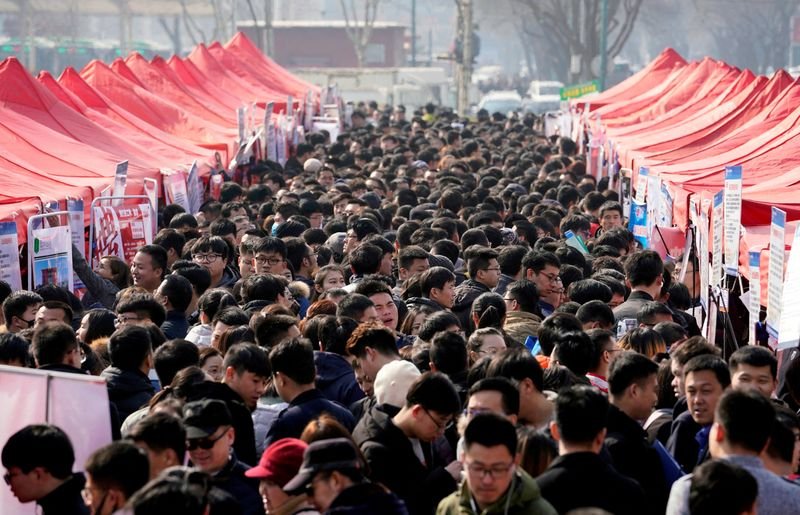By Ryan Woo, Ethan Wang
BEIJING (Reuters) – Rising unemployment in China is pushing millions of college graduates into a tough business, with some forced to take low-paying jobs or even subsist on their parents’ pensions, a dire situation that has created a new working class of “you can”. – tail children”.
The phrase has become a social media buzzword this year, drawing parallels with the word “rotten tail buildings” for the tens of millions of unfinished houses that have plagued China’s economy since 2021.
A record number of college graduates this year are looking for jobs in a labor market depressed by the disruptions caused by COVID-19, as well as regulatory crackdowns on the nation’s finance, technology and education sectors.
The unemployment rate for China’s roughly 100 million young people aged 16 to 24 rose above 20 percent for the first time last April. When it hit an all-time high of 21.3 percent in June 2023, officials abruptly suspended the data series to reevaluate how the numbers were compiled.
A year later, youth unemployment remains a headache, with the reconfigured jobless rate hitting a 2024 high of 17.1 percent in July as 11.79 million students graduated this summer in an economy still weighed down by real estate crisis.
President Xi Jinping has repeatedly emphasized that finding jobs for young people remains a top priority. The government called for more channels for young people to access potential employers, such as job fairs, and launched supportive business policies to help boost employment.
“For many Chinese college graduates, better job prospects, upward social mobility, a sunnier life outlook — all the things a college degree once promised — have become increasingly elusive,” said Yun Zhou, Assistant Professor of Sociology, University of Michigan.
Some unemployed youths have returned to their hometowns to be “full-time children”, relying on their parents’ pensions and savings.
Even those with postgraduate degrees were not spared.
After spending years climbing China’s ultra-competitive academic ladder, the “rotten tail kids” are finding their qualifications are failing to secure them jobs in a bleak economy.
Their options are limited. They either lower their expectations of high-paying jobs or find any job to make ends meet. Some also turned to crime.
Zephyr Cao obtained a master’s degree from the prestigious China Foreign Affairs University in Beijing last year.
Now 27 and back in his home province of Hebei, Cao stopped looking for full-time work after lower-than-expected wages made him question the value of his education .
“If I worked for three or four years after my bachelor’s degree, my salary would probably be similar to what I get now with a master’s degree,” Cao said.
Cao said he is considering pursuing a doctorate in hopes that his prospects will improve in a few years.
Amada Chen, a recent graduate of Hubei University of Chinese Medicine, quit her sales job at a state-owned enterprise last week after just one month.
She blamed her decision on a toxic work culture and unrealistic expectations from her boss. During the first 15 days of her trial, she was paid just 60 yuan ($8.40) a day, despite having to work 12 hours a day.
“I cried every day for a week,” she said.
Chen had wanted to become a quality inspector or a researcher, jobs she believed would suit her skills as a major in traditional Chinese medicine.
But more than 130 application letters later, he was offered mostly sales or e-commerce jobs.
Chen said she is completely finding her career path and may return to modeling.
UNCERTAIN PROSPECTS
Unemployment among college graduates is not without precedent.
In 1999, China dramatically expanded university enrollment capacity in an attempt to produce a better-educated workforce to drive its rapidly growing economy.
But the supply of graduates kept outstripping jobs, with authorities raising concerns in 2007 about job availability, a problem that eased but did not disappear entirely as more young people armed with degrees entered the market.
The outlook is uncertain even when a student’s major aligns with market needs.
Shou Chen completed his third year at Beijing University of Posts and Telecommunications this year, majoring in artificial intelligence.
However, Chen has yet to secure an internship after more than a dozen applications and remains pessimistic about the job market.
“It could be worse,” she said. “After all, there will be more and more people (in this field).”
The supply of tertiary students will exceed demand from 2024 to 2037, after which the effects of declining fertility rates will kick in and sharply close the gap, according to a study published in June by China Higher Education Research, a journal run by the Ministry of Education .

New college graduates will likely peak at about 18 million in 2034, it said.
(1 USD = 7.1436 renminbi)
#Rottentailed #children #Chinas #rising #youth #unemployment #spawning #working #class #Reuters